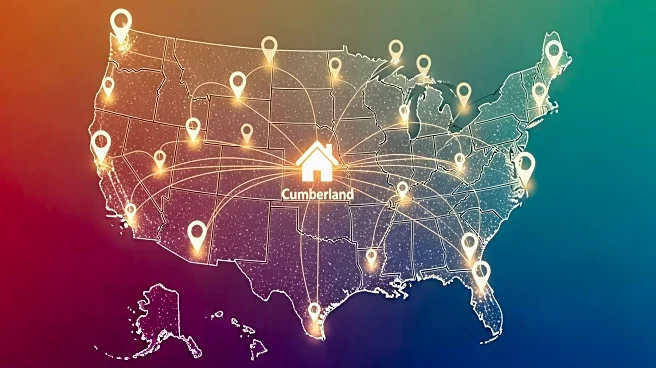What's Happening?
Recent data from Realtor.com indicates significant interest in Cumberland homes from residents of major U.S. metropolitan areas. The scarcity of homes on the market nationwide, which remains below pre-pandemic levels, has kept prices elevated despite
a slowdown in sales over the past year. This has led to increased online house hunting, with 97% of homebuyers utilizing online platforms according to a 2021 National Association of Realtors report. The cross-market demand data from Q3 2025 shows that Washington, DC, New York, and Baltimore are among the top metros with residents looking to buy homes in Cumberland, with view shares of 29.8%, 11.8%, and 9.9% respectively.
Why It's Important?
The interest from major metropolitan areas in Cumberland homes highlights a potential shift in housing demand patterns. As urban residents seek more affordable or spacious living options, areas like Cumberland could experience increased economic activity and population growth. This trend may influence local real estate markets, driving up property values and impacting community planning and infrastructure development. Additionally, the continued reliance on online platforms for home buying underscores the importance of digital tools in the real estate industry, potentially affecting how real estate agents and companies operate.
What's Next?
As demand from major metros continues, Cumberland may see changes in its housing market dynamics. Local governments and real estate developers might need to address infrastructure and community services to accommodate potential population growth. Additionally, real estate companies could enhance their online presence and digital offerings to cater to the increasing number of remote buyers. Monitoring these trends will be crucial for stakeholders in the real estate sector to adapt to evolving market conditions.
Beyond the Headlines
The shift in housing demand from urban to more rural or suburban areas like Cumberland could have broader implications for urban planning and environmental sustainability. As more people move away from densely populated cities, there may be a decrease in urban congestion and pollution, potentially leading to improved quality of life in those areas. However, this could also result in challenges related to urban sprawl and the preservation of natural landscapes.

















